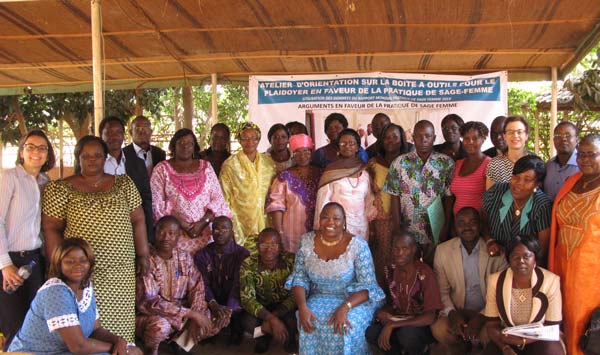 The year 2015 has been one of dramatic movement for global maternal and newborn health—from the end of the Millennium Development Goals to the beginning of a universal and even more ambitious global agenda. The Global Maternal and Newborn Health Conference is a key moment to examine how the Sustainable Development Goals will help ensure and improve quality of care, integration and equity. I’m pleased to see on the conference program a focus on midwives, a key partner in turning the conference themes and focus into a reality for women and their families everywhere.
The year 2015 has been one of dramatic movement for global maternal and newborn health—from the end of the Millennium Development Goals to the beginning of a universal and even more ambitious global agenda. The Global Maternal and Newborn Health Conference is a key moment to examine how the Sustainable Development Goals will help ensure and improve quality of care, integration and equity. I’m pleased to see on the conference program a focus on midwives, a key partner in turning the conference themes and focus into a reality for women and their families everywhere.
At this crossroads moment in global development, it’s a travesty that the countries burdened with 92% of the world’s maternal and newborn deaths have only 42% of the world’s midwives, nurses and doctors. Even though we have the medicines and the technology to make sure no woman or newborn dies from preventable causes, a person’s place of residence often still determines whether—and how—she will live or die. This is simply unacceptable. Fortunately, skilled midwives can prevent up to two-thirds of maternal and newborn deaths, and in doing so can turn around health care in their communities, according to UNFPA’s State of the World’s Midwifery Report 2014.

Midwives know that the health of a mother and her newborn are inextricably linked. If a woman dies in childbirth, the chances her newborn will survive are devastatingly grim. Protecting the health of newborns means ensuring that their mothers have access to respectful, high-quality health care. Midwifery is comprehensive, woman-centered care that spans across the reproductive, maternal and newborn health continuum: midwives educated to meet international midwifery standards can provide 87% of the essential care that women and newborns need. Midwifery also offers a more interdisciplinary and integrated approach to skilled care. That’s integration in action.
Midwives also connect communities to the complex health care system, through referrals to clinics and hospitals for more specialized care, especially during obstetric emergencies. FCI has found through our work that, in many communities with high maternal and newborn mortality, midwives are the only skilled health care providers. In the remote Sahel region of Burkina Faso, where most women still give birth at home, midwives provide lifesaving care to women and newborns where they live. In the Bolivian lowlands, some indigenous villages are hours away by boat from the nearest health clinic, and the government has recently launched a program to train and deploy midwives to these isolated communities. That’s improving equity in access.
The quality of care also matters. Midwives can provide culturally appropriate, respectful, quality care to ensure that women have a positive and safe childbirth experience and that newborns have the greatest chance of surviving and thriving. Midwives need rigorous, evidence-based training, government investment, collaborative work environments, continuing education opportunities, and incentives to work in challenging settings. That’s one step towards ensuring quality of care.
Of course, all the data we have on preventing maternal and newborn deaths and strengthening midwifery will fall flat without action. We need advocates, including midwives themselves, to bring the lessons from the GMNH conference directly to the doors of policy-makers in their countries. We know that midwives are the key to providing integrated, quality care to women and newborns in all kinds of settings. Now, we need to empower them to do their jobs and to get the message out: every woman and newborn deserves the best possible chance of surviving pregnancy and childbirth.
